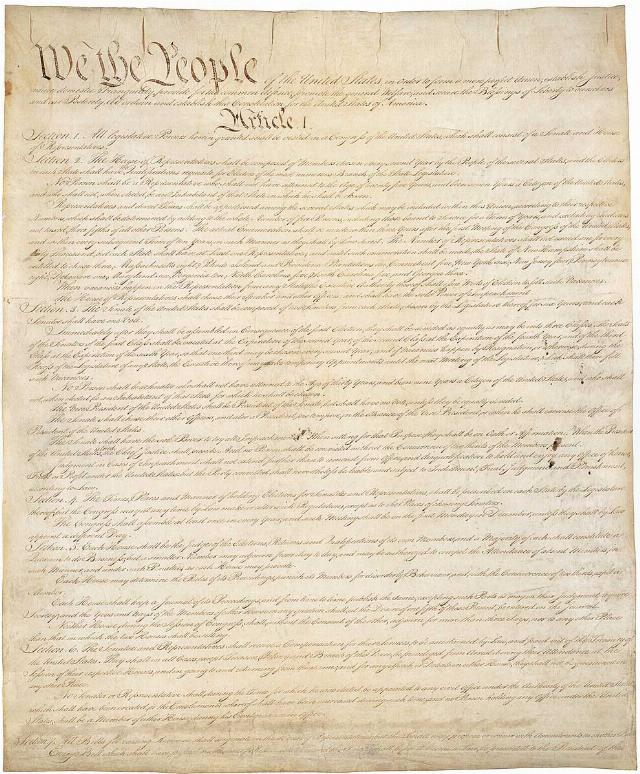The Second Circuit revokes qualified immunity
Imagine you’re a police officer. You see a vehicle committing a minor traffic violation, or maybe you don’t, but you just want to pull them over anyway. You approach the driver, who tells you he has a concealed carry permit, hands you the permit, which appears to be valid, and tells you he is carrying a handgun.
Feature: you’re a police officer in Connecticut, which is anything but a Second Amendment friendly state.

Graphic: Constitution of the United States, page 1. Wikimedia Commons.org. Public Domain.
Waterbury, Connecticut Officer Nicholas Andrzejewski conducted a traffic stop on Basel Soukaneh. Andrzejewski then . . .
…unlawfully and violently handcuffed and detained Soukaneh in the back of a police vehicle for over half an hour and conducted a warrantless search of Soukaneh’s vehicle after Soukaneh presented a facially valid firearms permit and disclosed that he possessed a firearm pursuant to the permit.
In Connecticut, drivers stopped by the police are not required to inform them they have a concealed carry permit, or they are armed. When an officer runs a records check, that information will come up, but the fact a citizen has a permit, or is carrying a concealed handgun, is not grounds, by itself, for a search of their person or vehicle. It certainly isn’t grounds for handcuffing and detaining anyone. In this case, Andrzejewski apparently did not believe he needed reasonable suspicion or probable cause, nor did he apparently list any in his report. He apparently believed, because he’s a police officer, he can do whatever he wants to do. Maybe Soukaneh just looked “funny.”
Soukaneh subsequently sued Andrzejewski in district court. The cop asked that the case be dismissed on summary judgement because of his qualified immunity. But the district court denied summary judgement and ruled that Andrzejewski wasn’t entitled to qualified immunity based on his conduct during the detainment and illegal search.
Andrzejewski then appealed to the Second Circuit. Not only did he claim he should be entitled to qualified immunity, but that Soukaneh, in effect, forfeited his Fourth Amendment rights barring unreasonable search and seizure because he chose to exercise his right to carry a firearm. He said that, “the presence of the lawfully owned firearm in the vehicle gave him the requisite probable cause to detain Soukaneh, search the interior of his car, and search his trunk.”
The Second Circuit is not known for Second Amendment sympathies. Amazingly, Andrzejewski tried to claim because the stop was made in the dark in a known high crime area, that alone justified the stop and search. The article doesn’t make clear whether the District Court or Second Circuit questioned the legitimacy of the initial stop, though it seems to imply one or both courts did. Obviously if the stop wasn’t legitimate, anything that occurred thereafter would be excluded under the exclusionary rule. Again, that does not appear to have explicitly come up.
Absent something indicating to the officer that the permit might not have been facially valid, or some other evidence of criminality or danger to the officer, we agree with Soukaneh. Accordingly, we conclude that Andrzejewski did not have the requisite probable cause to justify Soukaneh’s detention simply because he was notified of the presence of a gun and presented with the accompanying permit.
Which is an entirely sane, constitutional interpretation of the law in general and the Fourth Amendment prohibition against unreasonable searches and seizures in particular. The Court concluded:
Andrzejewski is not entitled to qualified immunity for this alleged conduct and, accordingly, the district court properly denied his motion for summary judgment.
The case was remanded back to the District Court. Andrzejewski can ask for an en banc hearing with the entire Second Circuit—it was a three-judge panel that heard the case—but should he lose, he, and his agency, could be on the hook for considerable civil damages, as well they should be.
Most people don’t know the police apply the Fourth Amendment every day. It’s a significant part of every police academy curriculum, and many agencies require regular refresher training. What seems clear in this case is Andrzejewski, either through a lack of training and supervision, or because he was badge heavy—had an arrogantly expansive view of his own importance and authority—ignored the Fourth Amendment’s prohibition on unreasonable, warrantless searches and seizures, and in so doing, lost his qualified immunity in this case.
Considering courts rarely revoke that immunity, and the Second Circuit is not remotely a gun rights friendly court, their decision in this case speaks volumes.
Mike McDaniel is a USAF veteran, classically trained musician, Japanese and European fencer, life-long athlete, firearm instructor, retired police officer and high school and college English teacher. He is a published author and blogger. His home blog is Stately McDaniel Manor.





